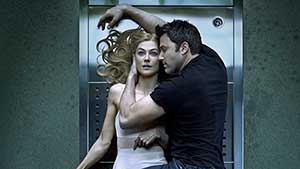Dear Cinema,
You had a good run. Quite frankly, you changed the world. But in the 21st century, the world has changed you. Look no further than David Fincher's latest film Gone Girl for proof.
It's the canary in the cinematic coal mine.
Gone Girl is a good film. Almost a great film. It has a runtime of two and a half hours, but earns every minute – and then some. The story is juicy and complex, the performances are dialed in just right, and the plot twists are both frequent and fascinating. In any other era, Gone Girl would have been worthy and welcomed in movie theaters.
Today, Gone Girl belongs on television. As a mini-series, where all great stories are told – unencumbered by the restraints of cinema.
Yes, restraints. Less than a generation ago, TV was widely considered a second-class medium. It was the domain of craftsmen instead of artists. A world filled with topical jokes and disposable drama. A place for censored stories and restrictive, sponsor-driven structures. Not to mention production limitations galore. Of course that's no longer the case, as Game of Thrones, Boardwalk Empire, Homeland, Mad Men, and countless other TV programs have proved.
In the new Golden Era of Television, the rulebook has been thrown out the window.
Everyone heralds HBO as the game changer, but that channel is more poster child than messiah. Fantastic television mini-series have always existed (Roots, North and South, Jesus of Nazareth), but today, the mini-series has become the gold standard for great storytelling. Turning to a mini-series for a rich, nuanced and ambitious story is no longer the exception, but the expectation.
Which brings us to Gone Girl. A film whose scope, scale and stars are all better suited for a serialized TV format.
David Fincher should have known better. He's one of the most exciting American directors working today, and a rare example of an auteur who doesn't write his own screenplays. Fincher's recently proven with House of Cards that he's the perfect candidate for helming a mini-series, which makes his "step-backwards" into cinema all the more frustrating.
I have not read Gillian Flynn's much-loved book, so this is certainly not one of those complaints about "how much better the book was". Flynn did a fine job adapting the screenplay herself. How do I know this? Because by the film's third act, I was craving more time with the characters, more detail about their relationships and more scope to the story. It could be because I didn't read the book that I wanted to savour the story even more. And why I felt the weakness of film as a medium.
After the delicately paced first act of Gone Girl, the twists and turns almost start to feel rushed as the film gains momentum. Character turns become pulpy instead of relatable. There are moments of revelation that almost beg the audience to take a breather to reflect and engage in conversation, the way you can with a mini-series. Instead we barrel forward to the climax and a time-crunching denouement.
Part of me craves the discussion that a mini-series affords before everything is wrapped up and answered for us. How can I not? The past year alone has brought us True Detective, The Honourable Woman and The Knick. Even a film like Fargo – which is a clinic in economical storytelling – lead to a dreaded-but-surprisingly-incredible re-imagining of that story. And at no time did that story seem stretched out or watered down on the small screen – it felt completely at home.
Don't take this the wrong way, Cinema, but to be worthy of a mini-series today is a wonderful thing. It's probably the best medium for entertainment we have right now, so you really need to go big, or we'll go home. Of course, there would be no justification for Gone Girl to go any bigger. Everything was already scaled perfectly for a network to take on.
And that delicious story…
You really can't compare books and film. Think about it: it's one thing for Michael Crichton to write about a park filled with dinosaurs, but it's quite another to bring them to life in a way that's still believable 20 years later. But the distinction between film and television is now almost non-existent. Gone Girl proves that we live in an era where film can simply mean "less" than TV.
So I guess when it comes to Gone Girl, I wanted more than you can offer.
Sincerely,

Christopher







